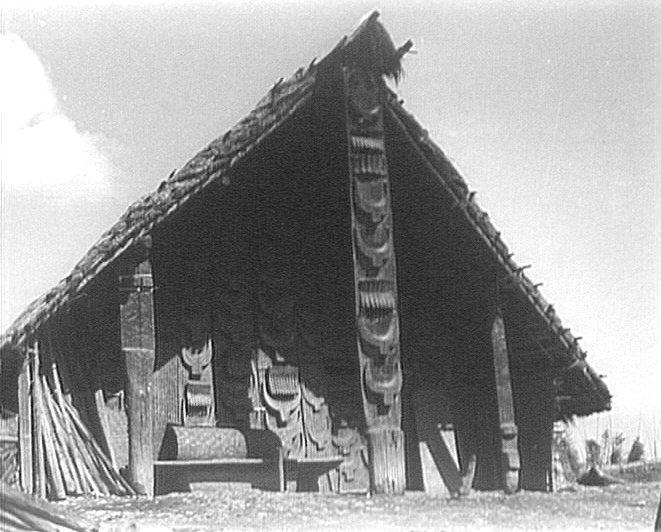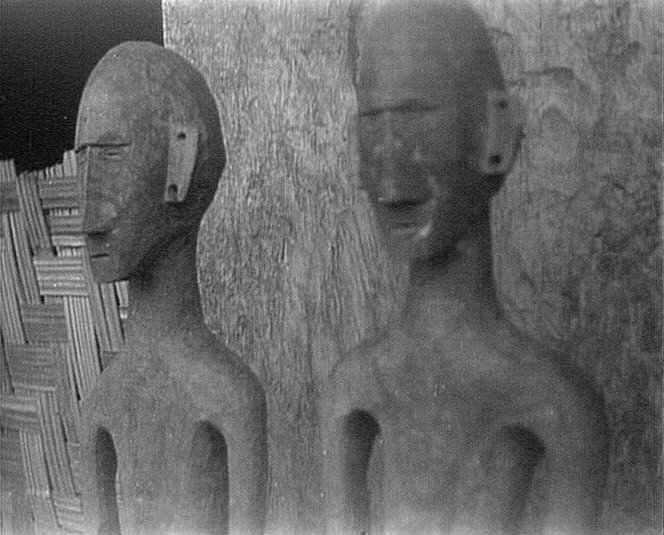Once upon a time there was a boy called Amang, and his parents died when he & his sister were very young. Some people gave them a little, most people did not. When all the villagers went with daos to clear the new jhums, Amang went too, but he had no dao and had to pull down the bamboos and jungle with his hands, and in so doing blocked the path. Some of the villagers came along and found it blocked and were angry, and pushed it back again, but a few others were kindly disposes and cut a little here and there till his jhum was cleared. He asked a man for some rice to plant in his field, but the man gave him cooked rice, which was useless. In this way he had much trouble.
One day his sister was preparing thread & the boy sat by. A tamaopui (dove?) came and sat in a tree near the house and sat there cooing. The boy saw it, and said: “I want that. Give me some of your thread.”
So she gave him some thread and he made a bow (tabaimpi) and shot the bird. He took it home & cut it up for food and in its crop he found rice/dhan. He plucked out the wing feathers and put them under the bed, and when he got up in the morning and looked, they had all turned into spears and daos and kodalis.
The he told his sister: “Don’t tell anybody. Just fetch plenty of water. He sat down inside the house with water & a stone and began sharpening all the tools and weapons. There were so many that his sister was doing nothing but fetch water, & people asked her why.
“My brother has bad diarrhoea, and can’t get up from his bed; so I am carrying water to make things clean.”
Then people called out that the house smelt, but the girl went on carrying water.
Then Amang took his new tools and went and prepared a jhum and planted the dhan he got from the pigeon’s crop; but no dhan came up, only big gourds (nraolu).
“What shall I do?” he said. “I planted dhan and got nothing but gourds. I will clear the weeds and see if the gourds are good for carrying water.” So he cleared the plants & leaves with his dao, and accidentally cut open a big gourds, and inside it was dhan.
The he went and built a big granary, and people laughed at him and asked why he built a granary (nsaou) when his crop was only gourds.
“Oh,” said Amang. “I shall put the gourds in it.”
Then he carried the gourds back to his granary and cut them open, and so much dhan came out that he filled the whole granary.
Now it happened that the villagers’ crops were all very bad, so that everyone came to him and asked for help, as they were starving. To those who had given to him he gave freely, but to those who had refused he gave only a very, very little.
One night his father came in his dreams and called him, and said: “Look up in the cane tray over the fire and you will find some of the rope we tied our mithan with; take it up to the pool above the village, cut it into little bits and throw it into the water, and come back after five days.”
Next morning Amang looked in the cane tray and found a little of the rope. He went to the pool and chopped it into little bits and threw them into the water and went away. When he came back he found a lot of tiny mithan as big as beetles. Next day they were as big as rats; next day as goats; and then full grown mithan with huge horns, so he built a stone fence to stop them escaping and went back to the village. There he went to the tingkupeo (priest) and said: “To-morrow I shall drive all my mithan into the village, and they are very large and very many, so warn everybody to stay indoors, or somebody may get trampled on.”
The tingkupeo went round the village calling out and warning everybody, but one old woman said: “What? What sort of mithan will he bring?” Next day everybody stayed indoors but the old woman and when Amang drove all his mithan in, one of them kicked her hard on the leg.
Amang had now become very rich, so he married and built a big house and made a feast for everybody, all the men and birds and animals. Everybody got themselves up in their best to come, and the Bhim-raj said to the rat: “Friend, arrange my tail, and I’ll arrange yours.” So the rat chewed and chewed at the feathers till there was nothing left but the rib and a little tuft on the end. Just then the call to go to the feast, and the Bhim-raj flew away without doing the rat’s tail. “Oh, my friend has gone away!” said the rat, and cried with disappointment. Then he took some earth and plastered it on his tail himself and went to the feast, and to this day when a rat sees a Bhim-raj he tries to bite its tail.
The sambhar and the langur also agreed to arrange each other’s tails; the sambhar prepared the langur’s beautifully, but just then the people began calling out: “The feast is ready! Come, come! Is there anyone else to come?” and off ran the langur. The sambhar was left calling out: “Oh, who will do my tail? Who will do my tail?” but nobody came, and he had to do it himself and so it is short and stubby to this day.
The owl said to the hornbill: “My eyes are so big and my face is so ugly I am ashamed to show myself. Let me hide under your wing.” So the hornbill hid him. When they got to the feast, Amang said: “Who will be King of the Birds?” and all the birds said: “The hornbill.” “Very well,” said Amang. “Show us what you can do. Get up and say your say.” The hornbill got up and squawked and everyone applauded and said he should be king; and then the hornbill flapped his wings, and out fell the owl. Everyone was so shocked at the ugly thing he kept under his wing that they cried out he should not be king. So they chose the Bhim-raj, and Amang told him to get up and show what he could do. The Bhim-raj flew round and round trailing his long tail and chattering like a Bengali and saying “Coolie! Coolie!” and they all applauded and chose him for King of the Birds.
The civet cat said to the jungle rat: “My smell is very bad, and I’m ashamed to go. Let me hide behind you.” So he hid behind his friend. When one of the people who were handing the food and drink came to where they were, he called out: “Oh, what an awful smell!” The jungle rat said nothing, but the second time the man came round he exclaimed again, and the rat was ashamed and said: “It isn’t me, it’s my friend.” Then the civet cat was overcome with shame and said: “I shall go away and hide by the road. You come along later, calling out, with a parcel of food for each of us.” And he went away.
In the path leading away from the village was a huge heap of dung and filthy refuse, and all the guests had to jump it as they went away. The Nagas jumped clean over it and never got dirty at all, and if they had not become dirty since through eating dogs and pigs and so on, they would be the cleanest race of all. The Manipuri and the Kachari each touched it with their hands, and so are particular about washing when they eat. As for the Thadou Kuki, he landed right in the middle.
Then Amang disguised himself and went and sat by the road and asked all the guests as they went whether they had had enough to eat. The Kachari said: “Oh, I’ve had a lot, but I could still eat a little more.”
“Very well,” said Amang. “Even though you get a lot to eat, your belly will never be quite filled.”
Exactly the same thing happened when the Thadou Kuki came along, and Amang said the same as he had to the Kachari. Then the Nagas came along with their spears and daos, ho-hoing and yelling as they went, and Amang asked them if they had had enough to eat.
“Oh, yes,” they said. “We’ve had any amount. You go along too. There’s plenty left.”
“Very well,” said Amang. “In future, even though you only get a little to eat, it will last you for a long while.”
After the Nagas the mithan came along, and Amang asked the same question. The mithan said: “I’ve had as much as I can eat, and I’m quite full”. So Amang said: “All right, you go into the jungle. Half the day you can eat, and the rest of the time you can lie down in a shady spot and chew the cud.”
So Amang’s mithan all went into the jungle, and all the wild mithan are descended from them.
After the mithan came the buffalo, and when Amang asked him, he said: “Oh, there wasn’t too much, and there wasn’t too little.” “Very well,” said Amang. “Even though you eat for days, you shall still be the same – neither too much nor too little.”
After a while the jungle rat came along with two parcels of food, and kept calling out as his friend the civet cat told him to. The civet cat heard him, and leaping out of the jungle, he bit off the rat’s head in revenge for what had happened at the feast, and ran off with it into the jungle. Then all the birds came along, and found the rat’s headless body in the road.
“Oh, oh!” they cried. “Here’s someone been killed! Let us pick up the body and carry it.” Then they all picked up the body and carried it, but the little hekupui was so short he had to balance his share on his head, which was stained by the blood. The bul-bul thought this so handsome he rubbed himself with it too, but he put it on the other end of him. The ngerui-na dabbled his wings and tail in it and made them red, and the crow rolled himself in the dark blood and mess in the road, and in doing so burst the jungle-rat’s gall-bladder and so is black to this day.
‘Note to Amang’
When all the animals were assembled at the feast, the tiger was not afraid of any of them, but when the men came along, shouting and hallooing, with their daos and spears all polished and flashing in the sunlight, the tiger blinked and shrank back a little, and so the men took the place of honour above the tiger, and so to this day the tiger is afraid of nobody but man
Ursula Graham’s Collection








